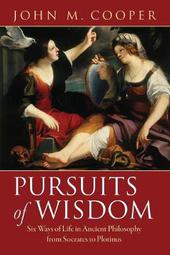
|
Pursuits of Wisdom: Six Ways of Life in Ancient Philosophy from Socrates to Plotinus
Paperback / softback
Main Details
| Title |
Pursuits of Wisdom: Six Ways of Life in Ancient Philosophy from Socrates to Plotinus
|
| Authors and Contributors |
By (author) John M. Cooper
|
| Physical Properties |
| Format:Paperback / softback | | Pages:456 | | Dimensions(mm): Height 235,Width 152 |
|
| Category/Genre | Western philosophy - Ancient to c 500 |
|---|
| ISBN/Barcode |
9780691159706
|
| Classifications | Dewey:180 |
|---|
| Audience | | Postgraduate, Research & Scholarly | |
|---|
|
Publishing Details |
| Publisher |
Princeton University Press
|
| Imprint |
Princeton University Press
|
| Publication Date |
25 August 2013 |
| Publication Country |
United States
|
Description
This is a major reinterpretation of ancient philosophy that recovers the long Greek and Roman tradition of philosophy as a complete way of life--and not simply an intellectual discipline. Distinguished philosopher John Cooper traces how, for many ancient thinkers, philosophy was not just to be studied or even used to solve particular practical problems. Rather, philosophy--not just ethics but even logic and physical theory--was literally to be lived. Yet there was great disagreement about how to live philosophically: philosophy was not one but many, mutually opposed, ways of life. Examining this tradition from its establishment by Socrates in the fifth century BCE through Plotinus in the third century CE and the eclipse of pagan philosophy by Christianity, Pursuits of Wisdom examines six central philosophies of living--Socratic, Aristotelian, Stoic, Epicurean, Skeptic, and the Platonist life of late antiquity. The book describes the shared assumptions that allowed these thinkers to conceive of their philosophies as ways of life, as well as the distinctive ideas that led them to widely different conclusions about the best human life. Clearing up many common misperceptions and simplifications, Cooper explains in detail the Socratic devotion to philosophical discussion about human nature, human life, and human good; the Aristotelian focus on the true place of humans within the total system of the natural world; the Stoic commitment to dutifully accepting Zeus's plans; the Epicurean pursuit of pleasure through tranquil activities that exercise perception, thought, and feeling; the Skeptical eschewal of all critical reasoning in forming their beliefs; and, finally, the late Platonist emphasis on spiritual concerns and the eternal realm of Being. Pursuits of Wisdom is essential reading for anyone interested in understanding what the great philosophers of antiquity thought was the true purpose of philosophy--and of life.
Author Biography
John M. Cooper is the Henry Putnam University Professor of Philosophy at Princeton University. He is the general editor of the authoritative English-language edition of Plato's complete writings, and the author of "Reason and Emotion" and "Knowledge, Nature, and the Good "(both Princeton), among other books.
ReviewsHonorable Mention for the 2012 Award for Best Professional/Scholarly Book in Philosophy, Association of American Publishers "[E]legant... Mr. Cooper's book proves to be an antidote to the rosy nostalgia that poisons stories about what philosophy was and what it has become... Unlike in the natural sciences, the central questions in philosophy are pretty much the same as they ever were: What should I believe in? How should I live? Mr. Cooper's book lucidly presents six appealing answers to those questions."--Brendan Boyle, Wall Street Journal "In this insightful and well-written survey, Cooper presents the ancient Greek and Roman philosophical tradition as one that is unified around philosophy as a way of life... Cooper offers an excellent survey that deserves a wide readership."--Choice "Cooper's book is comprehensive, accessible, and well-written, and his claim that we could follow the ancients in allowing philosophy to steer our lives in order to understand what they were up to makes his book a provocative and worthwhile read."--Angela Schwenkler, American Catholic Philosophical Quarterly "Cooper's attempt to write a book for a wide readership is successful. Readers interested in the subject of ancient philosophy as a way of life will find the book provocative, and those who seek a sophisticated introduction to ancient moral theory will learn a great deal from it."--Christopher Edelman, Journal of the History of Philosophy
|